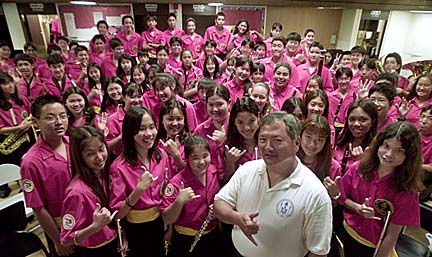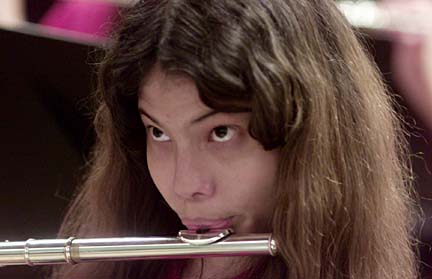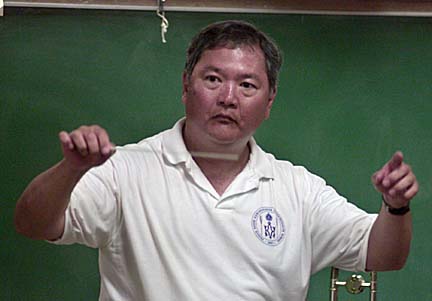


Band director Leonard Hasuko has heard his students play "With Quiet Courage" dozens of times during rehearsals, but when they played the moving ballad at a recent contest, their performance "came very close to moving me to tears." Band students transform
challenges into successThe Kawananakoa school band wins
a top award under its director's leadership
By Pat Gee
Star-BulletinHe had always told his Kawananakoa Middle School students that "you know you've done your job as a musician if you can make someone cry in the audience."
Apparently, the judges felt equally moved, because they awarded the band the Gold Award, the top award at the Heritage Festival in Las Vegas on May 5. As the only middle school to enter a contest for high school bands, they beat musicians much older and more experienced from 14 other bands. Hasuko's trip coordinator had mistakenly entered them in a high-school contest, he said.

Kelli Koga, an eighth-grader who plays clarinet, said the band was "really scared and nervous when he told us" they would be competing against high-schoolers. But Hasuko always told them: "If you want to do it, you can do it. Just try your best," she said.Krystal Sato, an eighth-grade clarinetist, said her fellow band members "thought we were going to lose against the high-school players. We were really happy and surprised we won. When they announced it, I said, 'My God, we won!'"
Most of his students didn't know a thing about playing an instrument when he first started with them two years ago. Hasuko, an accomplished clarinet player, had to teach them to play their 12 different instruments.
That's why he is most proud of winning the Adjudicator's Award on top of winning the gold. It is given only to bands with scores higher than 92 out of 100 points, based on national standards of excellence. His band earned scores of 92, 93 and 95 from the three judges, and it was the first time in his 25-year career that he had taken a band to compete in a regional contest, he said.
"It's amazing what young people can do. The students like challenges. Without challenges they get bored," he added.

More important than teaching them how to read notes, Hasuko trained them to infuse feeling into their music. That's probably what distinguished the Hawaii band from the others, he said. The "difference between a good band and a great band" is being able to "capture the spirit and emotional content of the music," he said.From the beginning of their musical training, he spent a lot of time "fine-tuning the band" or working on musical phrasing -- "giving a phrase a different nuance ... a little crescendo, or slowing down a crescendo, stretching the notes to give the music a little more feeling ... that's the most difficult thing," he said.
Quite often he stops the music in midnote to nudge them in his low-key way: "You guys give me the heebie-jeebies. It's like you guys just playing notes. Be more conscious of what you're playing."
Or he will imitate an error with his voice, sending the class into giggles while getting the point across.
Hasuko praised his students for their self-discipline and dedication, which really came through during the three-week public school teachers strike last month. Hasuko told them before the strike, "I'm depending on you to practice regularly," because he would not be holding practice for a while. He had intended to start working with them the second week of the strike, but waited until the third week to begin.
"The kids were happy to come (to rehearsal). They all understood the mission we were on," he said.
"It was a very stressful time for me. The teachers knew I had to rehearse, yet they wanted us to maintain unity. It made it hard for me to leave them," said Hasuko, but they were supportive of him once he started rehearsals.
Sato said when they first started rehearsing with Hasuko after a two-week layoff, "we were kind of junk. We didn't sound musical. Mr. Hasuko says you can play notes but not necessarily be playing music."
"We practiced at home during the strike because we knew we had to do a good job. It was harder doing it at home because we didn't know what we were doing wrong. ... I don't mind practice; it was worth it," Sato said.
Aaron Sakamoto, an eighth-grade trombone player, said at first "we sounded really bad, and we were a little worried. We knew we had to work hard."
Hasuko uses different methods to get them to improve, Sakamoto said. Sometimes "he teases us," but once in a while he yells.
"He has a loud voice," Sakamoto said, but he doesn't have to use it very often because "he teaches us to become responsible. He tries to teach us how to behave -- no fooling around -- and when we go to concerts, to leave the area just as we found it or better."